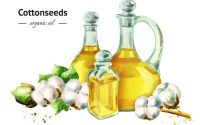Benefits of Cottonseed Oil
Public health advisories promote cottonseed oil as a “healthy” alternative to tropical oils because of its high unsaturated fat levels, which, findings show, has cholesterol-lowering properties – particularly LDL cholesterol. It is also free of cholesterol and has low levels of saturated fat, both of which are promoted by mainstream media and medical advice as culprits in heart disease.
Apart from this so-called cholesterol-lowering action, cottonseed oil, along with almond oil and wheat germ oil, has high concentrations of vitamin E. Of the three, cottonseed oil is the most practical choice due to almond oil’s expensive price and wheat germ oil’s bitter flavor.
Vitamin E is a potent antioxidant that plays a role in the prevention of diseases, such as Alzheimer’s disease, cardiovascular disease, and prostate cancer. Conventional health experts advise getting vitamin E from vegetable oils like cottonseed oil, because people do not eat vitamin E-rich foods on a daily basis. It is also believed that vitamin E contributes to the long shelf-life of cottonseed oil.
How to Make Cottonseed Oil
Although cottonseed production has existed for over a hundred years, the oil’s processing methods were developed only years later.
During the 1800s, cottonseed mills were used to extract oil from cottonseeds and only yielded half of the amount of oil found in the seeds. Today mills have evolved into either screw press or solvent extraction facilities. These modern mills produce double the amount of oil produced in traditional mills.
Modern processing of cottonseed oil involves numerous processes, but the main techniques are:
|
Bleaching |
|
Winterization |
|
Hydrogenation |
|
Deodorization |
|
Interesterification |
Compared to other oils, cottonseed oil requires less hydrogenation because it is naturally stable. Because of this, it has relatively lower levels of trans fat.
How Does Cottonseed Oil Work?
The primary use of cottonseed oil is for cooking. Despite its stability and long shelf life, it is advisable to only buy a few months’ supply. Storage should be in a cool and dark place.
When cooking with cottonseed oil or any vegetable oil, it is strongly advised to avoid the use of copper instruments, such as thermometers and utensils. Copper causes the deterioration of these oils.In fact, I recommend NOT cooking with these vegetable oils at all, as there is only one truly stable and healthful oil to use, which is organic coconut oil.
Is Cottonseed Oil Safe?
As shown by my suggestions above, I disagree with health claims surrounding cottonseed oil. While it boasts relatively low concentrations of trans fat and stability, these “benefits” show only half of the story. Cottonseed oil, whether unrefined or processed, can bring significant problems to your health.
Unrefined Cottonseed Oil
Initially, cottonseed contains gossypol, the compound that is responsible for the yellowish color of the crop’s oil. It is toxic to non-ruminant animals and reacts with protein to reduce the oil’s nutritional value.
In a study published in the Journal of Animal Science,gossypol was found to induce reproductive problems in females by disrupting estrous cycles, pregnancy, and early embryo development in non-ruminant species. The same study also reports the negative impacts of gossypol on male reproductive health, such as infertility, sperm immotility, and reduced sperm counts. Moreover, other symptoms of gossypol toxicity include breathing problems and anorexia.
Refined Cottonseed Oil
With the rampant use of cottonseed oil, manufacturers have found a need to enhance it. Some of their objectives included:
•Lowering or eliminating gossypol in cottonseed oil
•Increasing the yield of cottonseed oil extraction
•Increasing the oil’s PUFAs and vitamin E concentrations
•Reducing saturated fatty acids
Although refined cottonseed oil is promoted to be pure and clean, the refining process alters the oil’s structure entirely and exposes it to a number of chemicals. Clearly, there is nothing natural in this process!
Furthermore, 93 percent of the cotton crop grown in American soil is actually genetically engineered. Several studies have highlighted the adverse effects of GM crops, including reproductive problems, organ disruption, digestive problems, and allergic reactions.
There are also reports indicating that cottonseed oil has a high pesticide load and mold contamination, which may lead to allergies. If you’re allergic to other vegetable oils like canola oil, you’re most likely allergic to cottonseed oil as well. I personally recommend steering clear of vegetable oils. Avoiding saturated fat is one of the worst health decisions you can make – it is important in many of your bodily functions, and will not cause heart disease as mainstream recommendations have led you to believe.
Rather than frying your foods, I advise you to eat them close to raw. This will preserve the food’s nutritional profile and limit your exposure to trans fat. However, if you insist on cooking your foods, I recommend using coconut oil, as it is resistant to high heat damage. Olive oil, on the contrary, should not be used in cooking because of its sensitivity to rancidity. It should only be used cold, as salad dressings.



